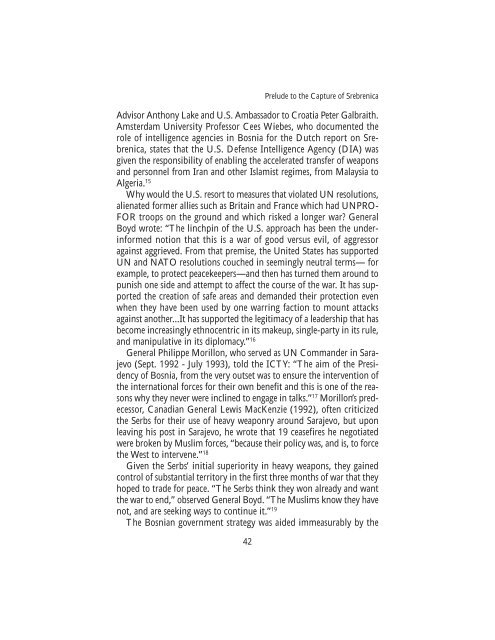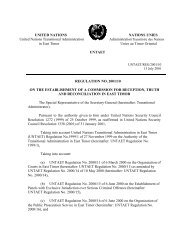The Srebrenica Massacre - Nova Srpska Politicka Misao
The Srebrenica Massacre - Nova Srpska Politicka Misao
The Srebrenica Massacre - Nova Srpska Politicka Misao
Create successful ePaper yourself
Turn your PDF publications into a flip-book with our unique Google optimized e-Paper software.
Prelude to the Capture of <strong>Srebrenica</strong><br />
Advisor Anthony Lake and U.S. Ambassador to Croatia Peter Galbraith.<br />
Amsterdam University Professor Cees Wiebes, who documented the<br />
role of intelligence agencies in Bosnia for the Dutch report on <strong>Srebrenica</strong>,<br />
states that the U.S. Defense Intelligence Agency (DIA) was<br />
given the responsibility of enabling the accelerated transfer of weapons<br />
and personnel from Iran and other Islamist regimes, from Malaysia to<br />
Algeria. 15<br />
Why would the U.S. resort to measures that violated UN resolutions,<br />
alienated former allies such as Britain and France which had UNPRO-<br />
FOR troops on the ground and which risked a longer war? General<br />
Boyd wrote: “<strong>The</strong> linchpin of the U.S. approach has been the underinformed<br />
notion that this is a war of good versus evil, of aggressor<br />
against aggrieved. From that premise, the United States has supported<br />
UN and NATO resolutions couched in seemingly neutral terms— for<br />
example, to protect peacekeepers—and then has turned them around to<br />
punish one side and attempt to affect the course of the war. It has supported<br />
the creation of safe areas and demanded their protection even<br />
when they have been used by one warring faction to mount attacks<br />
against another...It has supported the legitimacy of a leadership that has<br />
become increasingly ethnocentric in its makeup, single-party in its rule,<br />
and manipulative in its diplomacy.” 16<br />
General Philippe Morillon, who served as UN Commander in Sarajevo<br />
(Sept. 1992 - July 1993), told the ICTY: “<strong>The</strong> aim of the Presidency<br />
of Bosnia, from the very outset was to ensure the intervention of<br />
the international forces for their own benefit and this is one of the reasons<br />
why they never were inclined to engage in talks.” 17 Morillon’s predecessor,<br />
Canadian General Lewis MacKenzie (1992), often criticized<br />
the Serbs for their use of heavy weaponry around Sarajevo, but upon<br />
leaving his post in Sarajevo, he wrote that 19 ceasefires he negotiated<br />
were broken by Muslim forces, “because their policy was, and is, to force<br />
the West to intervene.” 18<br />
Given the Serbs’ initial superiority in heavy weapons, they gained<br />
control of substantial territory in the first three months of war that they<br />
hoped to trade for peace. “<strong>The</strong> Serbs think they won already and want<br />
the war to end,” observed General Boyd. “<strong>The</strong> Muslims know they have<br />
not, and are seeking ways to continue it.” 19<br />
<strong>The</strong> Bosnian government strategy was aided immeasurably by the<br />
42



